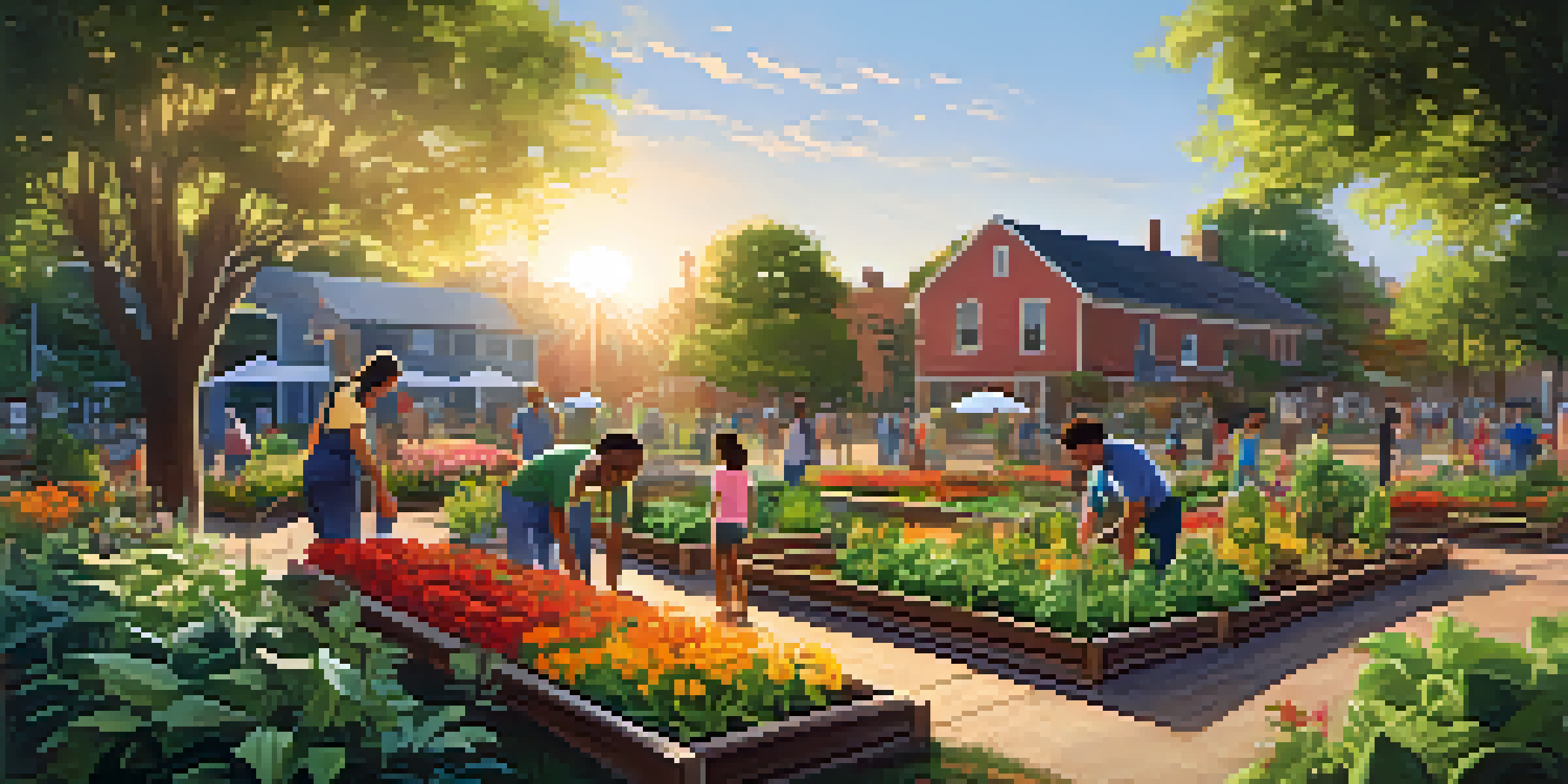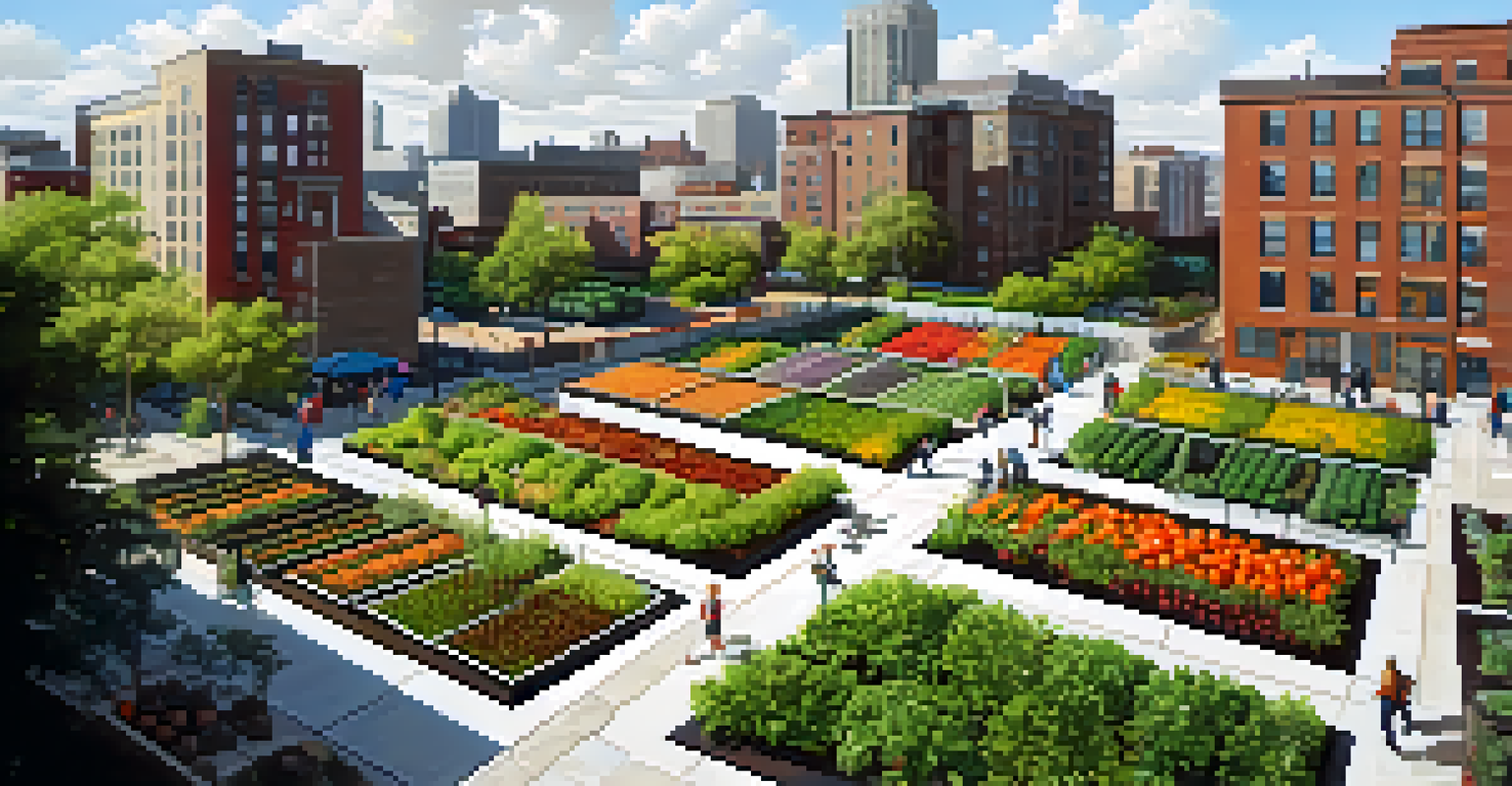The Role of Community Gardening in Atlanta’s Urban Landscape

Understanding Community Gardening in Atlanta
Community gardening in Atlanta has blossomed over the years, serving as a vibrant solution to urban challenges. These gardens are typically managed by local residents who come together to cultivate fresh produce, flowers, and herbs in shared spaces. Not only do they provide food, but they also foster a sense of ownership and pride among participants, turning concrete jungles into green oases.
Community gardening is a great way to bring people together and create a sense of belonging in urban environments.
In a city where access to fresh food can be limited, especially in food deserts, community gardens play a crucial role in promoting food security. They enable residents to grow their own fruits and vegetables, reducing reliance on grocery stores that may not offer the healthiest options. This grassroots movement not only nourishes the body but also enriches the community spirit.
Moreover, these gardens are often catalysts for neighborly connections, bridging gaps between diverse populations. They create spaces where people from various backgrounds can come together, share stories, and learn from one another. In this way, community gardening transcends mere agriculture; it cultivates relationships and a sense of belonging.
Environmental Benefits of Urban Gardens
Community gardens contribute significantly to environmental health in urban areas like Atlanta. They improve air quality by increasing green spaces, which act as natural air filters. Plants absorb carbon dioxide and release oxygen, making our cities not only livelier but also more breathable.

Additionally, these gardens help manage stormwater runoff, reducing the risk of flooding in metropolitan areas. By allowing rainwater to soak into the soil, they prevent overwhelming the city’s drainage systems. This ecological function is particularly important in Atlanta, where heavy rainfall can lead to significant water management challenges.
Community Gardens Boost Food Security
In Atlanta, community gardens provide residents with access to fresh produce, enhancing food security in urban areas.
Furthermore, urban gardens support biodiversity by providing habitats for various species of birds, insects, and pollinators. This is vital for maintaining ecological balance in an urban setting, where natural habitats are often diminished. By fostering these environments, community gardens play a crucial role in preserving Atlanta's rich biodiversity.
Economic Impact of Community Gardening
Beyond their environmental advantages, community gardens can also have a positive economic impact on Atlanta's neighborhoods. They often provide a source of fresh produce that can be sold at local farmers' markets, creating income opportunities for community members. This aspect of gardening not only fosters entrepreneurship but also supports the local economy.
Gardening is a way of showing that you believe in tomorrow.
Moreover, community gardens can increase property values in their vicinity. As neighborhoods become greener and more inviting, they attract new residents and businesses. This transformation can lead to revitalization efforts, making the area more appealing for investment and development.
Additionally, these gardens can save families money on groceries, allowing them to allocate funds to other essential needs. By growing their own food, residents can reduce their monthly expenses while enhancing their nutritional intake. This financial benefit is often a motivating factor for individuals to engage in community gardening.
Social Cohesion through Gardening
One of the most beautiful aspects of community gardening is its ability to foster social cohesion. These gardens serve as gathering places where people from all walks of life can come together and collaborate. They not only provide a space for growing food but also for building friendships and community support networks.
Through shared labor and learning experiences, individuals become more connected to their neighbors, creating a sense of belonging. Whether it's teaching a child how to plant seeds or sharing cooking tips, these interactions build trust and camaraderie among participants. The garden becomes a hub of social activity, breaking down barriers and encouraging inclusivity.
Gardens Enhance Social Connections
These urban green spaces foster social cohesion by bringing together diverse community members to collaborate and build relationships.
Moreover, community gardening initiatives often host events, workshops, and educational programs, further enhancing community ties. These activities offer residents opportunities to learn new skills, engage in meaningful conversations, and celebrate their collective achievements. In essence, community gardens nurture not just plants but also relationships.
Challenges Faced by Community Gardens
Despite their numerous benefits, community gardens in Atlanta face several challenges that can hinder their sustainability. One major issue is securing land access, as urban development pressures often threaten existing garden spaces. Without long-term leases or ownership, gardeners may find themselves displaced, losing their hard work and community connections.
Additionally, funding can be a significant hurdle for many community gardening projects. While some receive support from local organizations or grants, others struggle to find financial backing. This lack of resources can limit their ability to expand, maintain, or improve their gardens, ultimately impacting the community they serve.
Lastly, maintaining volunteer engagement can be a constant challenge. As interest wanes or schedules change, gardens may fall into disarray without regular upkeep. Finding ways to keep community members involved and motivated is essential for the longevity of these urban green spaces.
Educational Opportunities in Community Gardening
Community gardens serve as valuable educational platforms for individuals of all ages in Atlanta. They offer hands-on learning experiences about sustainable agriculture, plant biology, and environmental stewardship. Through workshops and mentorship programs, participants can gain practical skills that extend beyond the garden.
Schools often partner with community gardens to provide students with experiential learning opportunities. These partnerships can ignite a love for nature and healthy eating among young learners, fostering lifelong habits. Engaging children in gardening activities teaches them about responsibility, nurturing, and the food cycle, making it a fun and educational experience.
Sustainability Faces Urban Challenges
Despite their benefits, community gardens in Atlanta encounter challenges like land access and funding that threaten their longevity.
Furthermore, community gardens can serve as venues for adult education classes focused on cooking, nutrition, and gardening techniques. These programs empower individuals to make healthier choices and inspire them to share their knowledge with others. By cultivating both plants and minds, community gardens contribute to a more informed and health-conscious community.
The Future of Community Gardening in Atlanta
As Atlanta continues to grow and evolve, the future of community gardening looks promising yet requires intentional efforts. Urban planners and local governments are increasingly recognizing the value of green spaces in creating livable environments. This shift in mindset can lead to more support and resources for community gardening initiatives.
Innovative approaches, such as vertical gardening and hydroponics, are also gaining traction in urban settings. These methods can maximize small spaces and increase food production, making community gardening even more accessible to city dwellers. As technology and sustainability practices merge, the potential for community gardens to thrive expands.

Ultimately, the future of community gardening in Atlanta lies in community engagement and collaboration. By continuing to unite diverse groups around the shared goal of fostering green spaces, residents can ensure that these gardens remain vital components of the urban landscape, enriching lives for generations to come.